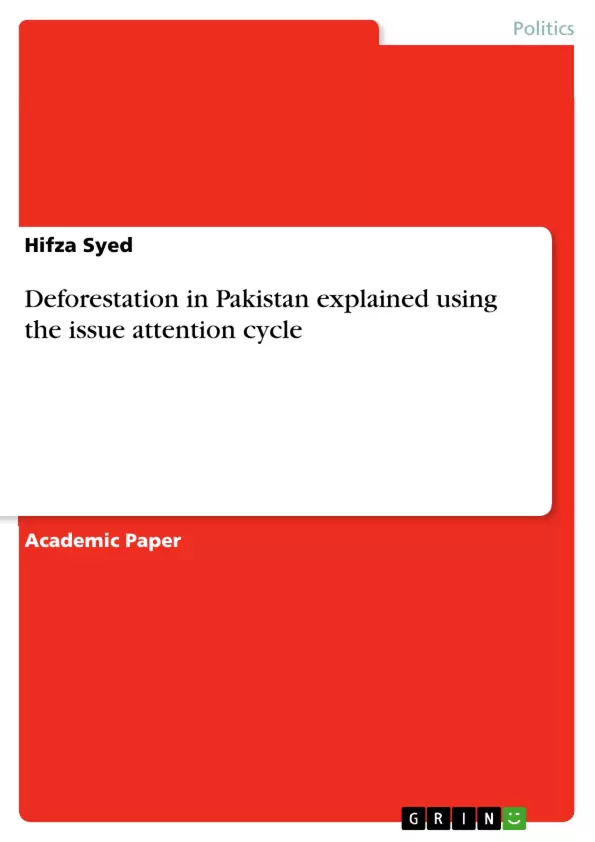This work explains deforestation in Pakistan usind the issue attention cycle. The forests are time and again professed as an important ecological resource and that they can be permanently depleted, and are non-renewable. Forest resources therefore need to be harnessed in a sustainable manner. There is a need for a legally binding ‘world forest convention’, just like existence of climate change treaties, to keep the issue of deforestation on the agenda, to ensure sustainable management of forest resources and to limit their overexploitation.
Deforestation is a true example of "Tragedy of Commons". When one individual cuts or burns down a tree for his benefit, there is a higher probability that others will follow the same course of action to increase their individual benefit as well, without realizing that the collective negative externalities such as environmental pollution, along with extinction of biodiversity and global warming will be augmented. Furthermore, according to Ostrom et .al, "the difficulty of exclusion and sub-tractability of common pool resources (CPRs) creates potential CPR dilemmas in which people following their own short term interests produce outcomes that are not in anyone's long-term interest".
Being a Common Pool Resource, forests are not owned by any particular person or even the government and therefore limiting its overexploitation becomes difficult. As a result, we face the CPR dilemmas in Pakistan in the form of continuous threat to forest resource by timber mafia, villagers who depend on fuel wood, forest fires, overpopulation and illegal logging et cetera.
According to United Nations Food and Agriculture Organization the forest cover of Pakistan has been reduced to fewer than two percent from previous four percent of the total land area which is among one of the lowest levels in this region as compared to the 12% standard set by United Nations. This highlights the vulnerable condition of forest reserves in the country and depicts the need to put focus in the area.
Table of Contents
- The pre problem stage.
- Alarmed discovery and euphoric enthusiasm
- Realizing the costs of significant process
- Gradual decline of public interest.
- The post problem stage..
Objectives and Key Themes
This text aims to explore the issue of deforestation in Pakistan through the lens of the Issue Attention Cycle. It analyzes the different stages the issue has gone through, from its initial neglect to periods of public awareness and the challenges faced in addressing the problem.
- The evolution of public and political attention to deforestation in Pakistan
- The role of international agreements and domestic policies in addressing deforestation
- The impact of deforestation on Pakistan's environment and economy
- The challenges of implementing sustainable forestry practices in Pakistan
- The importance of public engagement and awareness in combating deforestation
Chapter Summaries
- The pre problem stage: This section describes the period before deforestation became a major concern in Pakistan. It highlights the lack of attention and implementation of forest policies during this time.
- Alarmed discovery and euphoric enthusiasm: This section focuses on the period when deforestation gained international recognition and became a politically contentious issue, particularly with the Rio Conference (1992) and the debate surrounding a global forest convention.
- Realizing the costs of significant process: This section discusses the challenges of implementing effective forest policies in Pakistan due to jurisdictional issues between the federal and provincial governments and the lack of consideration for associated costs.
- Gradual decline of public interest: This section explores the factors that contributed to a decline in public interest in deforestation, including the lack of government and media attention and the competing priorities of the public.
Keywords
Deforestation, Issue Attention Cycle, Pakistan, Forest Policies, Sustainable Forestry, International Agreements, Public Awareness, Environmental Impacts, Economic Implications, Bonn Challenge, Billion Tree Tsunami, Tragedy of Commons, Common Pool Resources.
- Citation du texte
- Hifza Syed (Auteur), 2019, Deforestation in Pakistan explained using the issue attention cycle, Munich, GRIN Verlag, https://www.grin.com/document/510293



